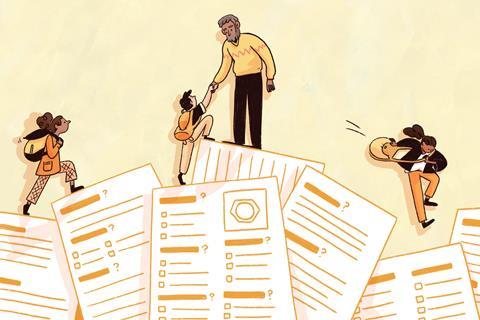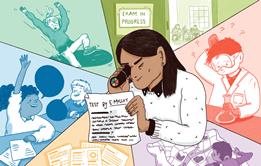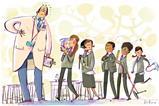Use your knowledge of exams to help your students maximise their chances of success on the big day

Assessment literacy involves a holistic approach to the chemistry curriculum and pedagogy. However, knowing how to do exams gives students an advantage and helps them to maximise their marks.
To help you improve this aspect of your assessment literacy, here are five questions to ask yourself about exam technique.
- What type of questions are asked in these exams?
- What type of responses are required?
- What common mistakes do students make?
- Which techniques can maximise credit or marks?
- How can past papers be used to prepare students?
How could you improve your answers? Read on to find out.
What sort of questions?
Preparing students for the types of question to expect on an exam is essential to help them focus on answering the question in the way the examiner expects. For example, multiple choice questions come in a range of different styles, so students need to be familiar with them. Read Multiple ways with multiple choice questions for a useful discussion of the various types of questions.
Short-answer questions need to be concise, often just one word or a phrase. Look at previous examination papers and their mark schemes to see the types of response required.
Long-answer questions require structured, multi-step answers. These can be daunting for some learners and you’ll find useful strategies to approach this type of question in Strategies for six-mark questions.
How to respond
Command words indicate what type of response is required from the student. Teachers need to familiarise themselves with the intention of each command word; these are usually proved by the exam board. For example:
Give: Only a short answer is required, not an explanation or a description.
Describe: Students may be asked to recall some facts, events or process in an accurate way.
Explain: Students should make something clear, or state the reasons for something happening.
Help your students master command words will help you with this.
Common mistakes
Examiner reports provide a range of examples of common mistakes that students make in exams. Three examples are:
- Not reading the question – this is when command words are key. What is the question actually asking me to do or show?
- Not showing your working for calculations – most exam questions require students to select or apply an equation, such as calculate relative formula mass, replace the equation with the appropriate values and provide the answer with the correct units. Students need to do all of these steps to gain all the available marks.
- Not using the correct symbols/conventions/units that are so important at all levels in chemistry. For example, element symbols, like Cu, must use the conventional capital and lowercase letters or, for mass calculations, is the answer in grams (g) or kilograms (kg)?
Techniques for top marks
The way in which a question will be marked can inform the student how they need to respond. Sometimes long-answer questions are marked by using a rubric, so students need to make sure they satisfy all the criteria.
Being familiar with key words in specifications is important because the word itself can be awarded a mark, rather than an alternative word that may or may not get credit.
Prepare students to apply their knowledge to unfamiliar situations to prevent them from being confused when they see a question that does not relate directly to what they have learned. For example, curly arrows.
Using past papers
How and when to introduce students to exam questions is debated. Some teachers regularly introduce exam style questions throughout the course, whereas others introduce them in the last three months of the course as part of revision. There are advantages and disadvantages to both, so be guided by your school’s or colleagues’ approach.
By addressing these five aspects of how to improve your exam technique, you will be able to support your students to maximise their success in exams. To develop your understanding further still consider becoming an examiner as outlined here.
The next and last article in this series will describe how to be critical of assessment strategies.

6 ways to develop your assessment skills

Master the essentials of assessment to maximise your students’ learning
- 1
- 2
- 3
- 4
- 5
 Currently
reading
Currently
reading
Tips to improve your exam technique
- 7


























No comments yet